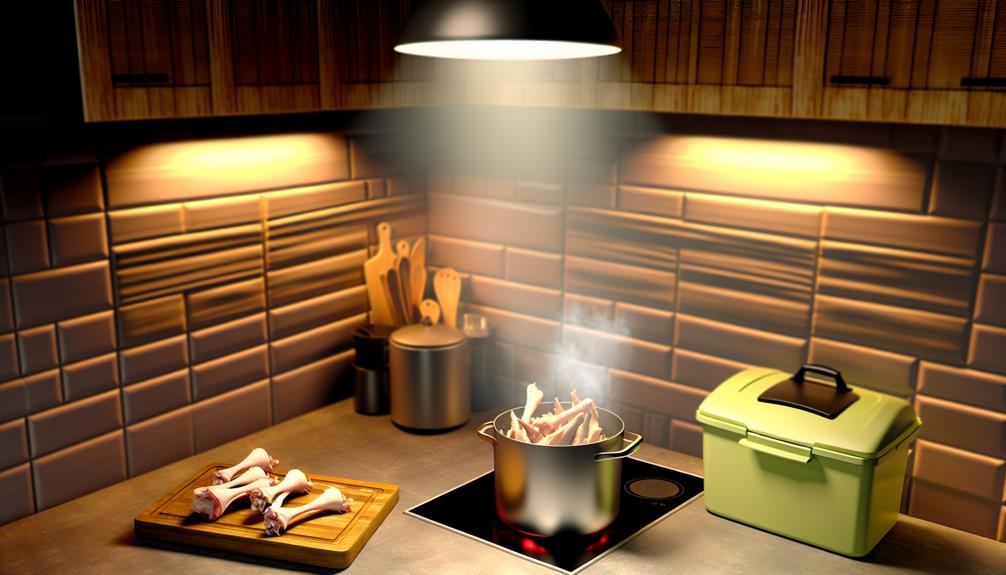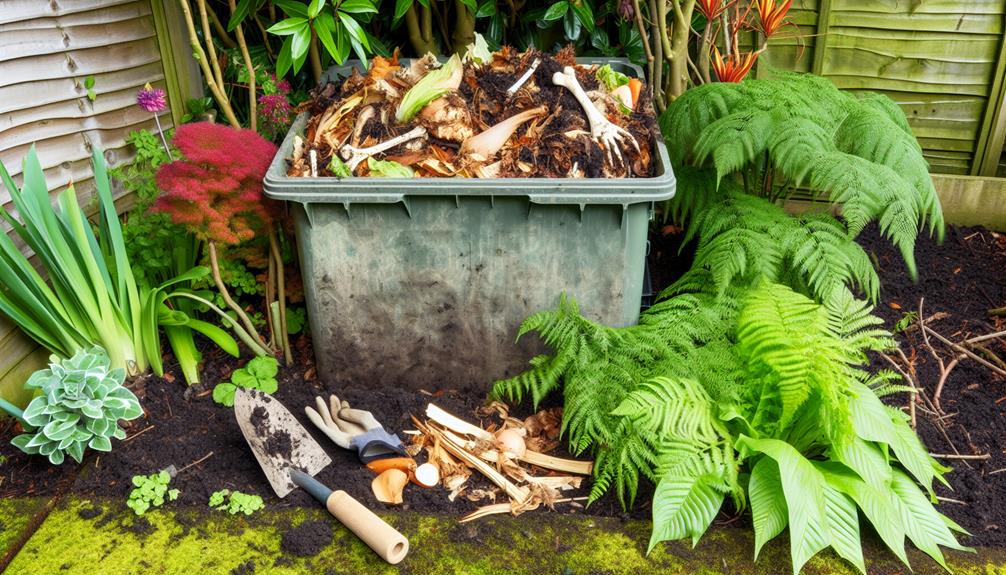

You can compost chicken bones, but it requires preparation and patience. First, boil or bake the bones to clean off any meat and fat. Once treated, crush them into smaller pieces using a strong blender or hammer to speed up decomposition. Mix these with your compost’s green (nitrogen-rich) and brown (carbon-rich) materials, and maintain moisture akin to a wrung-out sponge.
Turn the compost regularly to aerate and manage odors. Store bones in a sealed container to avoid pests and thaw them before composting. With these steps, you’ll successfully compost chicken bones, enriching your soil with valuable nutrients for better gardening results.
Composting chicken bones helps you reduce kitchen waste and enrich your soil with valuable nutrients. By incorporating chicken bones into your compost, you’re not only minimizing the amount of waste that ends up in landfills but also enhancing the quality of your garden soil. Chicken bones break down over time, releasing essential minerals like calcium and phosphorus that are vital for plant growth.
To start, make sure the bones are cleaned and dried. You can crush them to speed up the composting process. Mixing these crushed bones with other organic waste, such as vegetable scraps and leaves, creates a balanced compost pile. This combination ensures effective soil enrichment, providing a nutrient-rich foundation for your plants.
It’s important to manage your compost pile properly. Turning it regularly and maintaining the right moisture levels will help the bones decompose efficiently. This active approach to composting contributes to significant waste reduction, making your gardening efforts more sustainable.
Also Raed: Can You Compost Bread?
One challenge you might face is the longer decomposition time required for chicken bones compared to softer organic materials. Chicken bones can take several months to break down completely, which can be frustrating if you’re used to quicker composting cycles. Patience is key here, as rushing the process won’t help.
Managing pest attraction is another significant concern. Chicken bones, if not properly handled, can attract unwanted pests like rodents and raccoons. To minimize this risk, make sure you bury the bones deep within your compost pile and cover them with plenty of green and brown materials. This will help mask any odors that might attract pests.
Odor management is also important. Decomposing chicken bones can emit unpleasant smells if not handled correctly. To combat this, balance your compost pile with ample carbon-rich materials like leaves and paper. Regularly turning your compost can also help aerate it, speeding up decomposition and reducing odors.
To effectively pre-treat chicken bones for composting, start by boiling or baking them to eliminate any remaining meat and fat. Boiling bones for about an hour will soften them, making further processing easier.

Alternatively, baking the bones at a high temperature will dry them out, which helps in breaking them down.
Once you’ve boiled or baked the bones, the next step is grinding them. Use a strong blender or a dedicated bone grinder to pulverize the bones into small pieces. This step is important because smaller pieces decompose faster and more efficiently in your compost bin.
If you don’t have these tools, you can use a hammer or a heavy object to crush the bones manually. Just place them in a sturdy bag first to avoid any mess.
Also Raed: Can You Compost Asparagus?
Several methods can help you effectively compost chicken bones, ensuring they break down efficiently and enrich your compost. One effective way is to break the bones into smaller pieces before adding them to the compost pile. This increases the surface area, speeding up decomposition.
Make sure to maintain a proper carbon ratio, aiming for a balance between green and brown materials. Chicken bones are nitrogen-rich (green), so pair them with carbon-rich (brown) items like dry leaves or cardboard.
Maintaining ideal moisture levels is essential. Your compost should be as damp as a wrung-out sponge. Too much moisture can lead to foul odors, while too little can slow down the composting process. Regularly turning your compost helps to aerate it, promoting faster decomposition and preventing unpleasant smells.
Here’s a quick reference table to help you remember these tips:
| Tip | Description |
|---|---|
| Break Bones | Increases surface area for faster breakdown |
| Carbon Ratio | Balance greens (bones) with browns (leaves) |
| Moisture Levels | Keep compost as damp as a wrung-out sponge |
Also Raed: Can You Compost Body Wash?
Guarantee your composting efforts are essential by following these straightforward tips.

First, make sure proper storage of chicken bones before adding them to your compost pile. Store them in a sealed container in your freezer. This prevents premature decomposition and odor issues. When you’re ready to compost, thaw the bones and break them into smaller pieces. Smaller pieces decompose more quickly and efficiently.
Importance control is vital in maintaining a healthy compost pile. To minimize unpleasant smells, balance your compost with a mix of green and brown materials. Green materials include kitchen scraps and grass clippings, while brown materials consist of dried leaves and cardboard. Chicken bones fall into the green category, so compensate by adding plenty of browns.
Turn your compost pile regularly to aerate it. This promotes faster decomposition and helps control odors. A well-aerated pile is less likely to attract pests.
Lastly, be patient. Chicken bones take longer to break down compared to other compostable materials. Regularly monitor your pile and adjust as necessary. By following these tips, you’ll foster a thriving compost environment that efficiently processes chicken bones.
Yes, chicken bones are safe for composting with other kitchen scraps. They break down slowly, contributing nutrients to your compost pile. Join your community of eco-conscious gardeners and enhance your composting safety and nutrient contribution.
Chicken bones take quite a while to decompose in a compost pile, often over six months. Their decomposition rates are slow, but the bone nutrients they release can enrich your compost, benefiting your garden community.
Yes, composting chicken bones can attract pests, but you can practice pest prevention and rodent control. Bury bones deep in the pile and balance with greens and browns to keep your compost community thriving and pest-free.
Yes, you should crush chicken bones before composting. Bone preparation is essential because reducing bone size speeds up decomposition and minimizes any potential issues. You’ll feel more connected to nature with this eco-friendly practice.
By composting chicken bones, you contribute to nutrient enrichment of your soil and reduce landfill waste. It’s a small step, but it makes a big environmental impact, helping you feel part of a sustainable community.
Incorporating chicken bones into your compost can enrich soil, though it requires some effort.
Pre-treat bones by breaking them into smaller pieces or boiling them to speed up decomposition.
Use a hot composting method or bury bones deep in your pile to deter pests.
Monitor your compost regularly, turning it to maintain aeration.
By following these steps, you’ll successfully compost chicken bones, enhancing your garden’s nutrient content.
